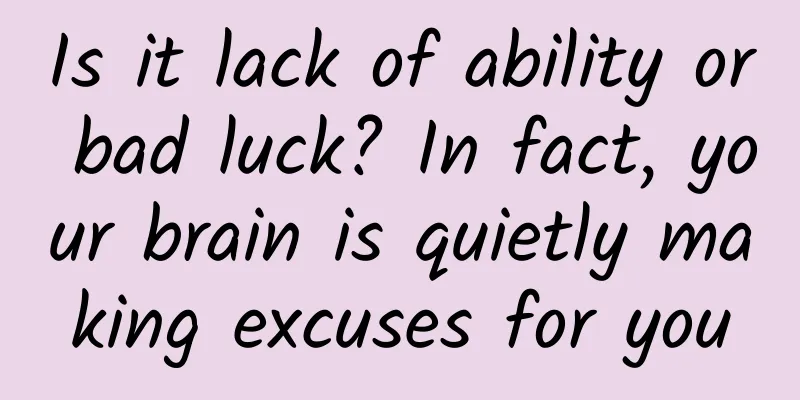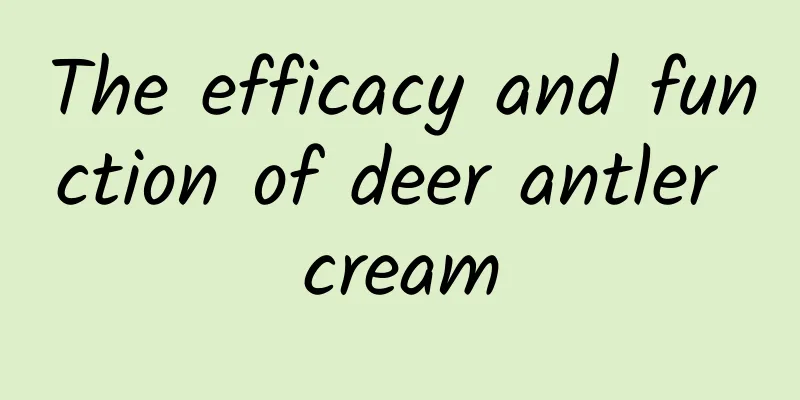Is it lack of ability or bad luck? In fact, your brain is quietly making excuses for you

|
Do you often feel that you work hard but don’t get the rewards you deserve? For example, you work hard to complete a project but feel that the bonus is not as good as expected, or you work hard in life but always feel that others are luckier and everything goes smoothly. In fact, this feeling of "efforts not being proportional to rewards" may be related to our internal psychological mechanism, namely "self-serving bias", which often makes us mistakenly believe that our efforts are not rewarded as they should be. Next, let's take a look at how this psychological bias affects our cognition. What is “self-serving bias”? "Self-serving bias" is a cognitive bias that we tend to attribute success to our own efforts or abilities, and attribute failure to external circumstances or others. For example, when a driver avoids a traffic accident, he may attribute this to his superb driving skills; but if a car accident occurs, he may blame it on bad weather, bad road conditions or vehicle failure. This bias is actually a psychological mechanism we use to protect our self-esteem. Each of us wants to maintain a good sense of self-worth and believe that we are capable and accomplished. If we attribute failure to our lack of effort or incompetence, we may feel frustrated and our self-worth will decrease. On the contrary, if we attribute these negative results to uncontrollable external factors, it will not only protect our self-esteem, but also make it easier for us to get out of setbacks and rebuild our confidence. Self-serving bias is very common in our daily work and life. For example, an employee may feel that he did not get a larger bonus because of the bad market conditions or the boss's favoritism. On the contrary, if he gets a good bonus, he will think that it is the result of his hard work and strong ability. Under this bias, we tend to exaggerate our own contributions and ignore the impact of the environment, thus having unrealistic expectations for rewards. Once the results are not satisfactory, we will think that the outside world is "unfair to us" rather than that our evaluation of the results is biased. Why is self-serving bias so common? In essence, the self-serving bias is a self-esteem protection mechanism inherent in humans. Everyone wants to have a high sense of self-worth and think that they are outstanding. When encountering setbacks or failures, if we can push the responsibility to the external environment, the psychological burden will be reduced and the emotions will be more stable. Studies have shown that this attribution method can indeed help us quickly restore confidence, especially when we encounter frequent failures. This bias even becomes a psychological defense mechanism that prevents us from giving up easily. From the perspective of the brain's attention and memory mechanism, when we succeed in life, the brain will selectively remember the reasons that make us proud and confident, and pay less attention to other factors. Therefore, it is easy for us to ignore external supporting conditions. For example, if someone wins a big prize, he may pay more attention to his own efforts and ignore the lucky factor. When we encounter failure, the brain will automatically look for external reasons and magnify some unfavorable conditions, thus forming a self-serving bias. In addition, psychological research has found that emotional state directly affects our perception of fairness. For the same thing, such as performance bonuses, when we are in a happy mood, we tend to feel that the bonus is fair, while when we are angry or uneasy, we are more likely to feel unfair, resulting in cognitive bias. How to avoid self-serving bias? The downside of self-service is that it may make us lose objective judgment and even hinder personal growth. Therefore, learning to manage this deviation is helpful for our work and life. The following methods can help us effectively avoid service deviation. 1. Face yourself and accept your flaws No one is perfect, and learning to accept your own imperfections is the first step to self-growth. When we don’t achieve the desired results in something, we might as well calmly analyze the reasons for the failure instead of blaming everything on the external environment. Active reflection can help us find areas for improvement and better improve ourselves. 2. Be aware of the impact of emotions on judgment When you are emotionally unstable, don't rush to evaluate whether things are fair or not. You can try to calm down and then analyze objectively. When you are angry or upset, your judgment is often biased. You may want to calm down your emotions through deep breathing, meditation, etc. before making judgments. 3. Multiple attribution, keep it objective Try multiple attributions and don’t be overconfident or self-blaming. For example, when we achieve success at work, we can acknowledge our own efforts, but we should also consider external resources, support from others and other objective factors. Similarly, when we encounter failure, we can consider both environmental factors and whether we have room for improvement. References [1] Fang Xuemei, Chen Song. The influence of uncertainty and emotion on fairness judgment[J]. Psychological Science, 2012, 35(03): 711-717. [2] Shepperd, J., Malone, W., & Sweeny, K. (2008). Exploring causes of the self-serving bias. Social and Personality Psychology Compass, 2(2), 895-908. Author: Chen Yufeng Reviewer: Yang Xiaoyang, Associate Professor, School of Psychology, Sichuan Normal University |
<<: La Nina: Winter is coming, I'll be back
>>: Can the ketogenic diet "starve" cancer cells? The list of scientific rumors in October 2024
Recommend
A comprehensive review of the development of China's large aircraft
May 5, 2017, Shanghai Pudong Airport. This is one...
From the Buddhist country to the human world, what has China’s “tower” experienced?
↑A group of National Geographic fans, focusing on...
The efficacy, effects and edible methods of cockscomb
The effects and functions of cockscomb are very e...
Can Agrimony be taken for a long time?
Herba Centifoliae is a Chinese herbal medicine th...
The efficacy and function of Vitex oil
Since Chinese medicine has fewer side effects, mo...
The world's first! Chinese scientists reveal details of its birth
Scientists reveal details of the creation of a hi...
Effects of Essence
Women will experience many skin problems as they ...
When you wake up, your sleep report is "automatically generated"? Smart pajamas are coming!
Compiled by: Gong Zixin Sleep is an important par...
What is the medicinal value of wild boar stomach
Wild boar is a wild animal. Its whole body is a t...
The efficacy and function of Abutilon
Abutilon is a very good medicinal material. It is...
E-commerce data: Juhuasuan weekly data (10.15-10.21)
The following picture is from Juhuasuan, which su...
1,100 new local infections! Omicron has another evolutionary branch, experts remind: This is crucial
From 0:00 to 24:00 on March 10, 555 new confirmed...
The efficacy and function of cinnamon bark
Traditional Chinese medicine is a Chinese traditi...
Will headphones that cost 9.9 yuan with free shipping damage your hearing?
Those who pursue cost-effectiveness can often fin...
Piling up mountains to create landscapes and recycling to build houses, urban construction waste is not "garbage"!
We currently have more than 900 million people li...









